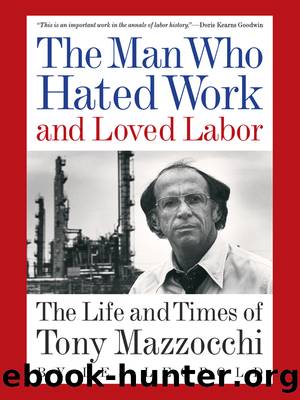The Man Who Hated Work and Loved Labor: the Life and Times of Tony Mazzocchi by Les Leopold

Author:Les Leopold
Language: eng
Format: epub
Tags: ebook, book
ISBN: 9781603580717
Publisher: Chelsea Green Publishing
Published: 2005-01-27T00:00:00+00:00
XI
Tony was still struggling over his broken marriageâand so was his estranged wife, Rose. Tony thought of himself as liberated, and especially after his separation, he veered toward libertine. The lefty gloss on sexual liberation was that marriage was bourgeois and patriarchal, subjugated women, and repressed healthy desire. But to Rose, Tony was simply a lying, cheating womanizer who broke up the family and left her to manage three girls on her own.
So which was itâprogressive lover or incorrigible scoundrel? Was Mazzocchi a womanizer feasting on newly liberated â60s women or a decent, caring, politically progressive, liberated male? Some in the emerging womenâs movement werenât so sure there was a difference. Many radicalized women felt used and discarded by movement men. They resented being relegated to menial support chores as their men gave speeches and took all the leadership roles. They felt unfulfilled sexually by men who didnât even notice. As a result, many would have agreed that Mazzocchiâs libertine ideology was nothing but a smokescreen for plain old philandering.
As one sympathetic observer put it, âAnyone who knew Mazzocchi was aware of his relationships. I am inclined to view them less ideologically and more related to his very intense and mobile life style. He was human and not necessarily a model of human perfection, or a paragon of virtue.â 56
And yet he was not a typical male chauvinistâthatâs why women liked him. As Tony put it, âI didnât treat women like crap.â
He didnât need to flirt overtly. When he walked into a room, he spoke to men and women in much the same way. Many women, maybe even most women, found him interesting. In fact, he was particularly attractive to âliberatedâ female activistsâyoung women in science, medicine, journalism, and politics who formed the backbone of the new womenâs movement. Part of this charm was his bright, engaging, and positive attitude. Part was the power he wielded.
Men were drawn, too. As one local OCAW union president put it, âOne thing I really respected about him was not only that he was really intelligent and that he believed in the cause, but also that he could deal both with really tough, hard, nasty men as well as being incredibly kindhearted and sensitive toward his friends, especially women.â 57
Mazzocchi inherited from his gay uncle Lester a strong dose of the CPâs egalitarian culture, which considered chauvinism a movement sin. And from the streets of Bensonhurst, he learned that sex was wonderful and should be relished as often as possible, just like breathing fresh air or eating Juniorâs cheesecake in Brooklyn.
Of course Mazzocchi had enough street smarts to know that he held a minority position better kept to himself. Nevertheless, he acted out his liberation theology on the sly as if the revolution already had arrived. In the late 1960s, it was easy to pretend that it had. The student movement, the womenâs movement, the antiwar movement, and the war itself blasted a gaping hole through the fortress of monogamy. Experimental lifestyles aboundedâcommunes, collectives,
Download
This site does not store any files on its server. We only index and link to content provided by other sites. Please contact the content providers to delete copyright contents if any and email us, we'll remove relevant links or contents immediately.
The Secret History by Donna Tartt(19090)
The Social Justice Warrior Handbook by Lisa De Pasquale(12190)
Thirteen Reasons Why by Jay Asher(8912)
This Is How You Lose Her by Junot Diaz(6887)
Weapons of Math Destruction by Cathy O'Neil(6281)
Zero to One by Peter Thiel(5802)
Beartown by Fredrik Backman(5755)
The Myth of the Strong Leader by Archie Brown(5508)
The Fire Next Time by James Baldwin(5446)
How Democracies Die by Steven Levitsky & Daniel Ziblatt(5219)
Promise Me, Dad by Joe Biden(5154)
Stone's Rules by Roger Stone(5088)
A Higher Loyalty: Truth, Lies, and Leadership by James Comey(4964)
100 Deadly Skills by Clint Emerson(4926)
Rise and Kill First by Ronen Bergman(4789)
Secrecy World by Jake Bernstein(4753)
The David Icke Guide to the Global Conspiracy (and how to end it) by David Icke(4720)
The Farm by Tom Rob Smith(4514)
The Doomsday Machine by Daniel Ellsberg(4490)
